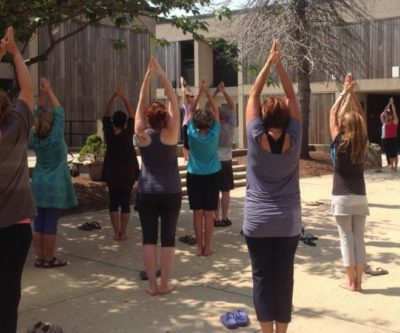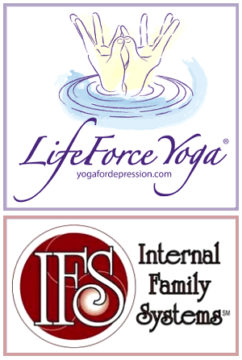
Internal Family Systems Therapy Goes to the Mat with LifeForce Yoga
August 19, 2019 - August 23, 2019
 A Workshop Intensive with LifeForce Yoga founder Amy Weintraub, and Internal Family Systems-trained therapist Angela Huebner, PhD, LMFT.
A Workshop Intensive with LifeForce Yoga founder Amy Weintraub, and Internal Family Systems-trained therapist Angela Huebner, PhD, LMFT.
The combination of IFS and LFY provide just the tools we need to slow down and tune in! In the process of learning LFY practices to help clients self-regulate, increase self-efficacy and self-compassion, you will connect to the wholeness and healing capacity within yourself. Return home empowered with your own practice, a better understanding of the IFS model, and ready to share these tools with your clients. All bodies and abilities welcome!
Mental and physical health care providers can practice their specialties more effectively when they offer clients simple, evidence-based LifeForce Yoga (LFY) practices to self-regulate, experience self-efficacy and build resilience, combined with an understanding of the Internal Family Systems model (IFS). We will integrate yoga practices for accessing Self-energy and meeting our parts. Every day will include accessible movement, yoga breathing, simple guided relaxation, experiential exercises, demonstrations, case studies, and clinical applications. Throughout the week, you will experience how the integration of IFS and LFY enhances the healing process. CEU’s available.
 Participants will practice accessible LifeForce Yoga skills appropriate in the consultation room, and explore the combination of Internal Family Systems Therapy and LFY practices that help:
Participants will practice accessible LifeForce Yoga skills appropriate in the consultation room, and explore the combination of Internal Family Systems Therapy and LFY practices that help:
- Access Self-energy
- Strengthen Self-to-part relationships
- Un-blend parts
- Care for parts not yet unburdened
- Safely tend to exiles not yet unburdened
The LFY protocol is available to all; a yoga mat is not necessary. Participants will discover a gentle, evidence-based yoga protocol to help you self-soothe, clear your mind, and will practice:
- Accessible Yoga postures
- Breathing and meditations to calm and lift the mood
- Yoga Nidra for self-soothing and insomnia
Amy and Angela will guide you in practices that access your natural compassion and wisdom. You will leave refreshed, revitalized, and excited about your practice, with new tools for emotional and physical balance. Read more about the synergy of LFY & IFS here.
This weekend is open to the public, yoga teachers, and health professionals. All bodies and abilities welcome! CEU’s available.

Amy Weintraub, MFA, ERYT-500, C-IAYT, YACEP
Amy Weintraub, founder of the LifeForce Yoga® Healing Institute and author of the bestselling Yoga for Depression(Broadway Books, 2004) and the ground-breaking Yoga Skills for Therapists: Effective Practices for Mood Management (W.W. Norton, 2012), has been a pioneer in the field of yoga and mental health for over 20 years. She trains health and yoga professionals at notable international venues and offers workshops for everyday practitioners. The LifeForce Yoga® protocol is being used in residential treatment centers, hospitals and by healthcare providers around the world. She is involved in ongoing research on the effects of yoga on mood and has produced an award-winning library of evidence-based yoga and meditation CDs and DVDs for mood management. She edits a newsletter that includes current research, news, and media reviews on Yoga and mental health, archived here.

Angela Huebner, Ph.D., LMFT
Angela is a licensed Marriage and Family Therapist (LMFT) in private practice in Falls Church, Virginia. She combines the art of psychotherapy with the science of change to help people identify and break out of patterned thoughts and behaviors that keep them stuck. She is a certified IFS clinician and LFY practitioner. In her 17 years as a tenured associate professor in the Department of Human Development’s Marriage and Family Therapy Program at Virginia Tech, Angela taught various clinical courses including Internal Family Systems and interpersonal neurobiology. Angela believes that when we are out of alignment with ourselves or with our partners, our system (body, mind, spirit) lets us know. Sometimes our system uses the language of depression. Sometimes worry and anxiety. Sometimes anger or sadness. Sometimes aches and pains. Our internal system provides us feedback if we listen.
For more information, see angelahuebner.com.
